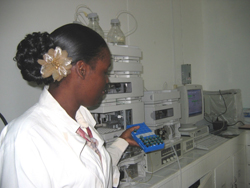You are here » Home » Telling Our Story
Case Study
New equipment allows laboratory to test food products for toxins
Peanuts Prepare for Export Market

| |
Photo: USAID
|
|
A technician at the Guyana Food and Drug Department Lab in Georgetown, Guyana selects samples to be tested with new equipment.
“The most important challenge facing exporters is ensuring food safety by preventing and controlling aflatoxin contamination of products,” said the Minister of Agriculture.
|
Challenge
In the remote Rupununi region of Guyana, peanut farming dominates the local economy. Farmers depend upon the crop as their main source of income, and newer agricultural techniques have boosted production from 1,100 pounds per acre to over 2,500 in four years. With rising production, Guyanese farmers can now supply not just local markets, but also export markets in the Caribbean. However, peanut exports have been constrained by food safety concerns. In particular, the local crop needs to be tested for aflatoxins, a group of carcinogenic toxins that occur in the soil. Guyanese farmers cannot sell peanuts unless they are certified as free of all aflatoxins. Current food safety testing and certification mechanisms cannot keep up with the increased demand for testing, leaving peanut harvests ineligible for export.
Initiative
Since 2005, USAID has been helping the Guyanese Food and Drug Department (FDD) improve the quality and efficiency of food safety testing mechanisms by providing both training and equipment. After installing new testing equipment, USAID sponsored a two-week training program to teach specialists and technicians from the FDD, the University of Guyana, and private companies how to use the machines. With the new equipment, the FDD is able to issue aflatoxin certificates quickly and guarantee that levels of aflatoxins are below the limit established by international food safety standards. The certificates ensure public safety and open the way for farmers like those in Rupununi to export their goods anywhere.
Results
Since the training, the Rupununi region has sent 28 samples of various peanut products to be tested with the new equipment, ranging from peanut-based foodstuffs used in local school lunch programs to raw peanuts for general consumption. All the samples passed the aflatoxin test easily. Guyanese producers can now look forward to exporting a safe product to Caribbean markets, improving the livelihoods of local farmers and helping to satisfy the region’s demand for peanuts.
Print-friendly version of this page (364kb - PDF)
Click here for high-res photo
Back to Top ^ | 

